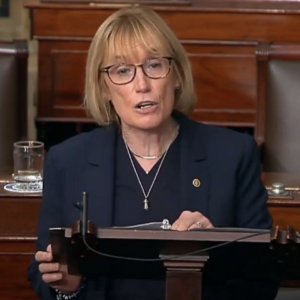All four Democrats in the New Hampshire federal delegation voted against bipartisan legislation to stop President Joe Biden’s plan to bail out $525 billion in college loans. It was the latest demonstration of their continued loyalty to Biden despite his decision to strip the Granite State of its First-in-the-Nation presidential primary.
On Thursday, the U.S. Senate voted 52-46 to block Biden’s proposal, which would have taxpayers pick up $10,000 in college debt for families earning up to $250,000 a year. Pell grant recipients could collect up to $20,000 in debt payoffs. Democratic Sens. Joe Manchin (W.Va.) and Jon Tester (Mont.) joined Democrat-turned-independent Sen. Kirsten Sinema of Arizona to vote with Republicans to pass the measure.
Both New Hampshire Democrats, Sens. Maggie Hassan, and Jeanne Shaheen, however, were “no” votes. A few days earlier, both Granite State Reps. Annie Kuster and Chris Pappas also toed the Biden line when the legislation passed the House with a bipartisan 218-203 majority. Pappas claimed to oppose Biden’s bailout during last year’s congressional campaign but reversed his position last month when it came time to vote.
Biden has made college debt payoffs part of his 2024 campaign plan to motivate younger voters and has pledged to veto the bill.
Deals to suspend or pay off college debt, by definition, tend to help upper-income families more than the nation as a whole. They are also expensive. The student loan holiday President Donald Trump began during the COVID-19 pandemic will cost taxpayers $195 billion by this August, according to the Committee for a Responsible Federal Budget.
In a nation of some 330 million, the bailout will go to about 40 million Americans or about 12 percent of the population. Even in New Hampshire, one of the best-educated states in the nation, only about 41 percent of the workforce has a bachelor’s degree or higher, the Census Bureau reports.
The people who would benefit are disproportionately affluent and suburban families. Many people who either chose not to go to college would pay off their loans or have already paid for their educations.
“The highest-income 40 percent of households (those with incomes above $74,000) owe almost 60 percent of the outstanding education debt and make almost three-quarters of the payments,” according to the left-leaning Brookings Institution. “The lowest-income 40 percent of households hold just under 20 percent of the outstanding debt and make only 10 percent of the payments.”
And the Congressional Budget Office noted in a new report that programs like debt forgiveness or income-based repayments that let borrowers off the hook for money they have promised to pay back have a “behavioral effect.” Once students see that they may not have to repay what they borrowed, they tend to borrow more. And students who planned to avoid debt choose to borrow, too.
“Overall, the annual volume of student loans would increase by about 12 percent, the CBO estimated, with both undergraduate and graduate students seeking more loans,” Reason magazine reported.
“Students who would be expected to take out federal loans would borrow more,” Leah Koestner, a CBO budget analyst, said last month. And “some students who would not be expected to borrow under current law would take out loans.”
The U.S. Supreme Court is expected to rule soon on whether Biden has the power to spend about $500 billion in tax dollars through executive rather than legislative action. Most experts, including until recently Rep. Nancy Pelosi (D-Calif.) and the Biden Department of Education, said he did not.
But he now has New Hampshire’s Democrats on board if he decides to act and the Supreme Court doesn’t stop him.
The delegation’s policy reversals and steadfast loyalty on behalf of Biden are particularly interesting given their public statements denouncing his decision to strip the state Democratic Party of its sanctioned role as the home of the first presidential primary. Biden and the DNC insist that South Carolina will go first (it won’t; New Hampshire will) and demand local Democrats get in line. And yet even when there are bipartisan votes Granite State Democrats could cast in opposition to the president, who many feel betrayed the state, they still stick with Biden.
If 2024 turns into a competitive cycle for New Hampshire’s congressional elections, the vote to bail out college grads with everyone else’s money may cause problems for the incumbents.



